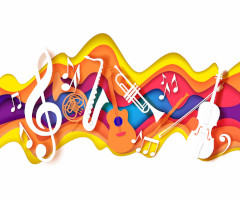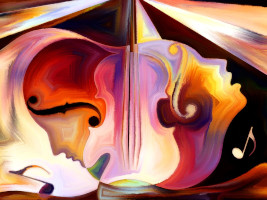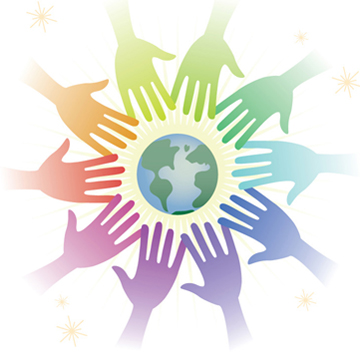Music and the Brain

Music and the brain have a unique and important connection, according to neuroscience. Listening to or playing even the simplest melody requires the interaction and collaboration of many parts of the brain. It is universal across all cultures and, like other arts, is a function of specific social and cultural influences. Music can provide pleasure, joy, and comfort, and can create life-changing experiences that involve almost every part of our brain.
Today, more people listen to music than ever before in the history of the world, and there are more avenues for experiencing music than anyone could have predicted even just a few years ago. Using functional magnetic resonance images (fMRIs), scientists can determine which neurons in the brain are active when someone is listening to music versus when no music is being heard, showing the connection of music and the brain. The field of music cognition (the study of music as a product of the human mind) existed before fMRIs, but there has been significant growth in this field of research and its application to health in recent years.
Listening to music regularly (and replaying tunes in our brains) helps neurons stay active and keeps synapse connections intact. Listening to music appears to facilitate learning, and participating more fully in creating music appears to provide additional cerebral advantages. For example, some types of music support hemispheric synchronization and the opportunity to achieve brain coherence (the orderly and harmonious connectedness between the two hemispheres of the brain). These two processes can significantly improve learning, and it shows there is an important, ongoing relationship between music and the brain.
Brain imaging studies have shown that “happy” music stimulates the reward centers of the brain, causing the production of the chemical dopamine. Dopamine is the chemical that mediates pleasure in the brain. It is released during pleasurable situations and stimulates us to seek out pleasurable activities. It is the feeling we experience when we are eating a wonderful meal, having sex, or using certain drugs. It produces “chills” when we listen to a beautiful piece of music. Music is a nonpharmacological way to influence our physiological and psychological state of being, showing that there can be an immediate effect from the relationship between music and the brain.

Physiological effects on the brain from musical experiences are varied and include the following:
- Music has the capacity to reach hidden areas of the brain. While no one has discovered a “music center” in the brain, there are unique circuits in the brain that respond specifically to music, and they are different than the circuits in the brain that address speech and memory. This is the reason people with an impaired ability to speak or carry on a conversation because of a condition such as Alzheimer’s disease, stroke, or Parkinson’s disease may still be able to sing.
- Music serves as a storehouse for memories. Pictures, thoughts, and vivid recollections can all be encoded in the mind when an individual listens to music. Music helps people with memory loss access these memories and become more aware of the present, their surroundings, and other people. Depending on the severity of the injury, even people who have some form of brain injury may regain partial or full access to memories by listening to music.
- Music can improve hearing and speech. Listening to music can enhance hearing by improving our ability to perceive speech in a noisy environment—a common issue when age-related hearing impairment occurs.
- Music can decrease blood glucose levels. When stress levels are reduced through the use of sound and music, blood glucose levels also decline. High levels of blood glucose are associated with an increased risk for diabetes, decreased wound healing, and increased risk for several chronic diseases.
- Music can improve sleep quality. Individuals who have sleep problems often experience improvement after listening to soft music at bedtime. This may be due to a decrease in stress hormones, an increase in muscular relaxation, or an increase in oxygen to the brain.
- Music is useful in relieving stress in every age and in virtually every culture. Music can trigger responses in your heartbeat, emotions, and attentiveness. Almost instantly, you can be activated, awakened, and feel like dancing.
- Soothing music may produce a hypometabolic response, similar to a relaxation response, in which autonomic, immune, endocrine, and neuropeptide systems are altered.
Psychological effects of music and the brain evoke a wide variety of strong emotions, can improve emotional states as well as enhance one’s mood, and can produce many responses including the following:
- Music can reduce anxiety and fear as well as create relaxing, soothing sensations.
- Music decreases preoperative anxiety in infants and reduces visitor stress in hospital waiting rooms.
- Listening to music during a surgical procedure has been shown to reduce cortisol levels and reduce the need for excessive anesthetic medications. Patients who listened to music had less anxiety and lower cortisol levels than people who took the antianxiety medications. Interestingly, for the staff, music may be distracting, but for surgeons, music can increase the speed and accuracy of task performance.
Throughout history, people have created, played, and enjoyed music. It has been the “backdrop” to every single aspect of our lives from the beginning of time. Profound social, cultural, cognitive, physiological, and psychological effects occur in our brain and body when we create, listen to, or play, music. The connection between music and the brain is substantial and can be an important aspect of wellness.
To learn more about music and the brain, or more generally about music therapy or brain health, check out our Certificate in Music Therapy and Sound Healing or Certificate in Brain Health, or check out the individual course on Music and the Brain.







